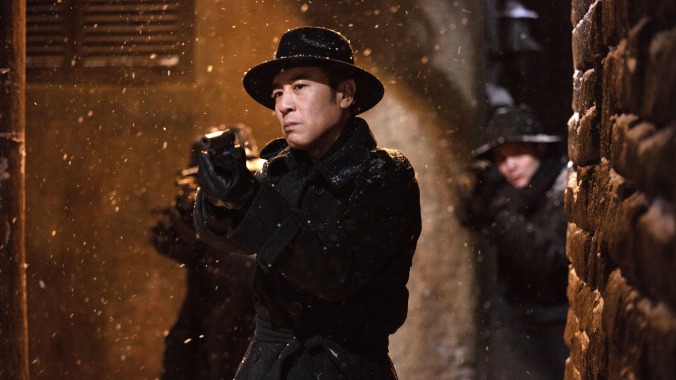In the opening overhead shot of Zhang Yimou’s
Cliff Walkers, four white parachute canopies descend into a snowy forest. It is the early 1930s and the heavily bundled parachutees are Soviet-trained secret agents who have been sent on a mission to Manchukuo, the puppet state established by the Japanese in northeastern China. As we soon learn, they’re not just a quartet but a pair of couples: Zhang (Zhang Yi) and Yu (Qin Hailu), Lan (Liu Haocun), and Chuliang (Zhu Yawen). They retrieve their suicide pills—four more white circles framed from above—and make for the city of Harbin, where it rarely stops snowing and everyone dresses in the manner of
Spy Vs. Spy’s Black Spy: black fedoras, black coats, black gloves, black everything. The grim local security chief, Gao (Ni Dahong), is on the hunt for moles. Snow clings to the crisscrossing telephone lines, insinuating an icy web. Identical figures chase one another through a maze of alleys. Did the suspense get lost somewhere in there, between the symmetries and the bird’s-eye views?
With their eclectic, Bernardo Bertolucci-esque stylizations and stifled historical settings, the dramas Zhang made in the ’80s and ’90s with Gong Li—among them Ju Dou, Raise The Red Lantern, and To Live—gave him an early reputation as a formidable stylist. Then, at the beginning of this century, he turned his attention to lavish, color-coordinated spectacle: Hero, House Of Flying Daggers, the 2008 Summer Olympics opening ceremony. He’s even done the faux black-and-white thing before, in the martial arts fantasy Shadow. But the purities and virtues of wuxia do not translate to the convolutions of a formulaic cloak-and-dagger story.
Every scene in Cliff Walkers will feel familiar: the close calls, the dead drops, the car chases, the poor man’s Hitchcockisms. There’s a fight on a moving train, a meeting in a movie theater (showing The Gold Rush, naturally), and some gruesome, sadistic torture. The difference between this spy film and any other is that almost everyone is dressed the same, basically interchangeable—which isn’t much of a difference at all. The costumes have an unworn look that, along with some of the decor, makes the oppressive palette seem artificial in a bad way—phony and cheap—which unfortunately fits with the movie’s sentimentality, underscored by the globally familiar sound of “the sad harmonica.”
We are reminded time and again that the good guys are heroic, brave, and selfless, but it’s only Zhou (Yu Hewei), the Communist agent who’s successfully infiltrated Gao’s counterintelligence unit, that ends up holding interest; his stakes and potential compromises are clear. There isn’t anything wrong with a filmmaker embracing patriotic and national themes; many of the greats did while taking a fair amount of propaganda at face value. The real test is what the filmmaker brings to the material—usually a question addressed at the long-term project of a nation, its absolutes, and its mythology. Barring that, the least they can do is throw the audience a few thrills, or at least a chase scene where you can tell who’s coming after whom.


 Keep scrolling for more great stories.
Keep scrolling for more great stories.